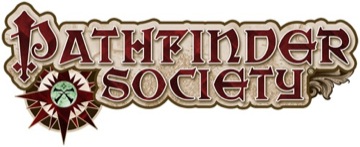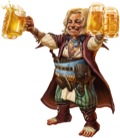With several new changes to improve Pathfinder Society Organized Play on the way over the next several months, one of the things I want to do to add to that improvement is feature venture-officers' knowledge about coordinating and organizing game days, as well as tips and tricks for all aspects of organized play. It's one thing to offer advice from here in Redmond, Washington. It is another to offer advice from the field. At least once a month, I hope to feature a blog, titled Stories from the Field, that is written by a venture-officer who wants to give back to the community through the Pathfinder Society weekly blog.
Dominick Trascritti, the Venture-Lieutenant of Tampa, Florida, has written this month's Stories from the Field blog. I reached out to all the VOs, and Dominick was one of the first to reply. He does some incredible work in Florida, especially by organizing PFS at several large conventons in central Florida each year. Thanks Dominick! Below is the article he wrote for the Pathfinder Society community.
The lifeblood of any organized play campaign is new players. More players mean there are more opportunities for everyone to play. For the good of the community, it is essential we help them avoid an uncomfortable start to the Pathfinder Society. This article offers some good practices to encourage new players, which in turn work to build a community.
Organizers, game masters, and seasoned players are the face of the campaign for those first four to five hours. Each has a role in that first session, and a smart organizer will take steps to ensure the player gets a good first campaign experience.
Setting the tone with the organizer, GM, and a few seasoned players avoids common mistakes. Don't badmouth other game systems, editions, or groups. Keep a positive tone about the community. Represent the hobby well. Everyone on that team answers questions or helps the new player find the answer. A player who asks questions is more comfortable and engaged.
As an organizer of a game day or convention, preparation leads to a smooth event. A smart organizer is ready for new players at every game session. It is a great idea to set aside seats or a whole table just for new players. Always have Pathfinder Society player numbers preprinted and a clean printed copy of the Guide to Pathfinder Society Organized Play on hand. Organizers should leave nothing to chance for that new player's experience.
Prepare a binder of the standard pregenerated characters for players to use and organize them so that its easy to read and select a character. Keep the binder filled with extra copies, and don't forget to have flyers for future events inside the front pocket. Using folders that fit inside a three ring binder looks good and makes it is easy to use and refill. I don't put blank character sheets or inventory forms in the binder. I try to keep it simple. Keep an extra set of cheap dice, pencils, and a miniature or two handy that you don't mind losing or don't mind giving to new players.
At the game day, make sure you arrive early. It is important to greet new players when they walk in and make them feel welcome. Give them the time to look around, ask questions, and receive a seat assignment. Often times a new player is a fish out of water, so to speak, so make sure to be considerate of the player's needs at what may be an awkward time for them. Learn their name and use it. Be direct, and keep it simple.
Make sure you give the new player a little attention while you seat them at the new player table. The Game Master is the second link in the chain. Introduce the table's Game Master and at least one other player. Give the new player simple directions and ask them if they need dice or a miniature.
The GM sets the expectations for the player by asking a few questions: what is the player looking for in an RPG or who is their favorite movie character. Use this to gently suggest a pregenerated character that might favor the new player's interest and playstyle. Sometimes new players want to make a new character before or during the first session. If there is little or no time to create a new character, explain that there are differences in Pathfinder Society and that keeping it simple with a pregenerated will start the action faster. Explain the 2nd-level rebuild rule and that they can use their own character at the next session.
Get the new player into the action right away. Explain the basics of the dice and character sheet, but save deeper explanations of game mechanics until the player needs to know the exact details. It is better to give prompts like "Roll a d20 to see if you hit" or "Roll a d20 to see if you resist being charmed" to a new player. Give them something to do, and they will feel part of the table. If they look frustrated, they are likely not having fun.
On the new player table, a smart organizer will "stack the deck" by including a seasoned player at the table to help others learn. This helps the GM focus on the game and running the table while ensuring the player has questions answered in a timely manner. A smart GM uses the seasoned player to give the new player a little attention. A peer who knows the ropes in the game is helpful to everyone and keeps the table moving.
As the game goes on, the GM should engage every player and treat the new person like part of the team. Nothing bores a new player like being treated as if they have a practice sword or only the "marshmallow" monsters attack them. A GM owes it to the player to present a challenge, even if the threat is more perceived than real.
The seasoned player can suggest actions for the new player, but let the new player control their own character. If they want to do something unusual, explain the consequences. Mistakes are great learning experiences. A new player that feels they pull their weight in the party often returns to the gaming table. Let the new player enjoy belonging as a member of the party.
When the game is over, explain the tracking sheet and the Chronicle. Give the new player the basics of the new character creation in the Guide to Pathfinder Society Organized Play, and suggest they use the Core Rulebook to create their own character for the second session. Again, make sure to keep it as simple as possible. Explain that at the third session they might use any other books they may own that fit the theme of their character and are listed on the Additional Resources page. It is important to set the expectation that they will have to own books to get fancy feats, traits, spells, or any number of other character options. Telling a new player that they can use a shiny new character next session is a great selling point, so use it!
An organizer should talk to the new player after the session and chat about the recent game. Make sure to keep the conversation friendly, and address the player by name. Encourage them to come to the next game, and exchange contact information. Avoid forcing a hard commitment. It is better to give them wiggle room and leave a positive impression.
One-on-one interaction grows the community of Pathfinder Society players. It may be time-consuming to prepare and welcome new players, but the invested effort makes the community a more welcoming place for newcomers and returning participants alike. The Pathfinder Society is not for everyone but everyone is welcome.
If you have tips and tricks that have worked with recruiting and retaining new players, please share those here. As a community, we serve each other best when we share ideas and tools that make all of our jobs just a bit easier. Thanks again to Dominick for writing the very first of our Stories from the Field blogs.
Have a very Merry Christmas and a happy new year!
Mike Brock
Pathfinder Society Campaign Coordinator











